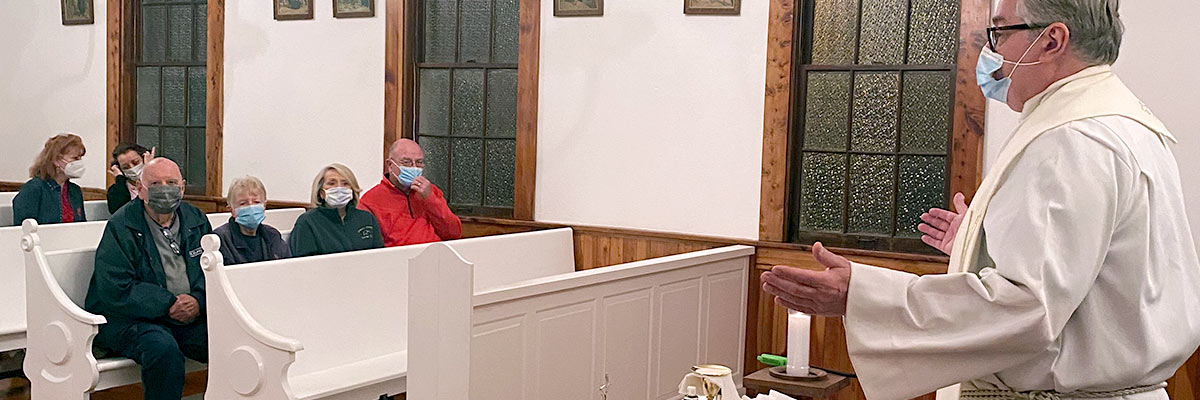Official Website of the
Catholic Diocese of Little Rock
Solemnity of the Most Holy Body and Blood of Christ 2014
Published: June 21, 2014
Bishop Anthony B. Taylor preached the following homily during the confirmation Mass at Our Lady of Good Hope Church in Hope on Saturday, June 21, 2014 and the Carmel of St. Teresa of Jesus Monastery and St. Theresa Church, both in Little Rock, on Sunday, June 22, 2014.
Download MP3 file to your device

Bishop Taylor
I — like many of you — am dismayed by how our society has lost its moral bearings. We are disintegrating into a culture that places little value on living for something bigger than oneself — producing what Pope Francis rightly condemns as an economy of exclusion.
This abandonment of so much that is right and good is due in part to the fact that we have made the individual the basic cell of society rather than the family, resulting in a new kind of idolatry: the worship of the self. Whatever I want! Repackaging religion to validate my preferences and accommodate my inclinations, remaking God in my own image and likeness. First it was artificial contraception — I get kids only when I want them.
Then easy divorce — I deserve to be happy, regardless of what it does to the children. Then abortion — even if someone has to die. Now same-sex marriage. And all along promoting policies intended to promote our own perceived self interests, but which are contrary to the common good — hardening our hearts to the poor, the immigrant — out of fear, out of the conviction that life is a zero-sum game and that their gain would somehow be our loss.
What we really are is “countercultural” in a culture that is profoundly sick.
On this feast of Corpus Christi, we remember that for the Christian the family must be the basic cell of society, not the individual — and that we as a Church are to be a family united to each other in the body and blood of Christ which we receive in the Eucharist. As family we are called to be there for each other and to sacrifice our own will when that is required by the common good, standing in solidarity especially with those who are the weakest and most disadvantaged among us.
The result is a religion that calls for the best from us, worshipping a God who takes us seriously because we are committed to building his kingdom rather than our own, out of the conviction that our all-powerful God will have no trouble creating win-win situations in which all can share as beloved members of his family. An economy of inclusion that is rooted in the truth of the human person as God has made us, provides for us and intends us to live.
In today’s first reading God provides for every member of the community of Hebrews in the desert, no economy of exclusion here. But their survival was due not just to the manna shared by all, but rather to their obedience of “every word that comes forth from the mouth of God.” In our second reading St. Paul says that though many, we become one body — one family — through our sharing in the body and blood of Christ.
And in our Gospel Jesus adds that in the Eucharist we not only become united with each other, we even more importantly become united with Jesus — and through him with God the Father — which will gain for us eternal life. “Whoever eats my flesh and drinks my blood has eternal life, and I will raise him on the last day.”
In the Eucharist Jesus provides not only for our salvation in the next life, he also shows us the path forward in this life through the moral desert to which our society’s idolatry of the self has reduced our nation, manifest — like with the ancient Egyptians — in our preferential option for wealth and power to the exclusion of the poor and vulnerable, and thus to the detriment of the common good.
So, “Do not forget the Lord, your God, who brought you out of the land of Egypt, that place of slavery; who guided you through the vast and terrible desert with its seraph serpents and scorpions, its parched and waterless ground; who brought forth water for you from the flinty rock and fed you in the desert with manna, a food unknown to your fathers.”
People say that we are “out of touch” when we oppose the ongoing disintegration of our society, but what we really are is “countercultural” in a culture that is profoundly sick. We are “in touch” with the truth which God has planted deep within every human heart. It is our culture that is “out of touch” with what really matters, and the consequences of our current idolatry of the self are — and will remain — devastating unless we change.
Today the Lord feeds us with his body and blood not only for our own benefit, but also to send us forth to make a difference: to bring that salvation to others. And as Pope Francis reminds us, in this life as well as in the next.









